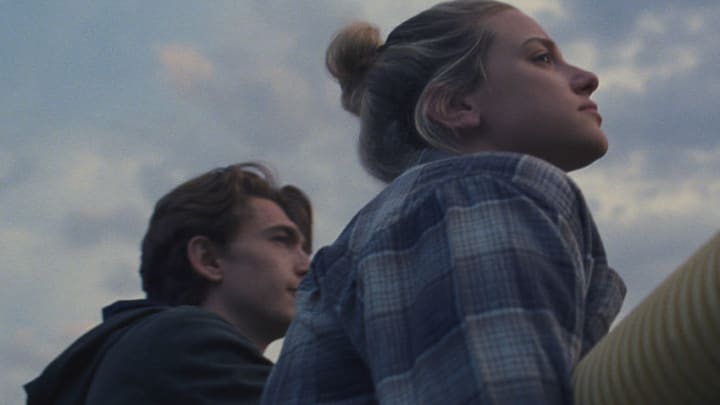Although Lili Reinhart gives the best performance of her career, even she can’t save Chemical Hearts from doomed teen romance mediocrity.
With movie theaters in the United States finally opening back up after five months of COVID-induced closures, it’s an odd landscape to be viewing movies in, and an especially difficult time to be the decision-maker who chooses whether or not a film should get a theatrical release.
Although some theaters will be open by the time this review is live, they weren’t when Chemical Hearts was released, making it one of the last films to hit the viewing public without the option of a theatrical release. We’ll be honest, maybe that was for the best — because although Lili Reinhart gives it her all, even her incredible performance can’t drag Chemical Hearts up from the dredges of mediocrity.
With Reinhart (known to most as girl-next-door Betty on The CW’s wildly popular series Riverdale) as its lead, Chemical Hearts follows the senior year of timid high schooler Henry Page (Euphoria‘s Austin Abrams) who falls head over heels for new girl Grace Town (yes, that’s her name), only to find out that she’s hiding a tragic secret.
The story is as by-the-numbers as they come, and by all accounts, this movie would’ve probably been much more at home had it been released at some point between 2012 and 2016, when “teens with illnesses” was the common storyline among genre favorites. However, with Chemical Hearts arriving five or so years too late, we can’t help but think that we’ve seen it all before — and done much better.
Chemical Hearts‘ shtick is that it revolves around Henry and Grace’s literary prowess. They serve as co-editors of their school’s newspaper, and instead of sending nudes or sexting, they recommend poems and pitch issue ideas as flirting — which is cute, but not nearly entertaining enough to justify basing a movie off of, which is where the film’s other shtick comes in.
From the second we meet her, we can tell that Grace is struggling. She walks with a limp and uses a cane, dresses in unflattering clothing, and pretty much always carries a scowl. Although it can certainly be refreshing to have a protagonist who doesn’t fit conventional beauty standards with how they act or dress, what’s happening here isn’t that. It’s the film de-beautifying the obviously gorgeous Reinhart for a big “whoa, she’s pretty now?” reveal later on down the line.
Before we get there, however, we learn the reason for Grace’s poor attitude and lack of regard for herself: She was in a tragic car accident that not only partially crippled her, but that killed her childhood friend/boyfriend. It’s an admittedly gut-wrenching reveal (especially when Henry takes Grace playing the same song in the car every day as being “their song,” when in reality it was hers and her ex-boyfriend’s), but as we mentioned, it’s nothing we haven’t seen before.
Neither Henry nor Grace are particularly interesting or original characters. Henry is practically a cardboard cutout of Logan Lerman’s character in The Perks of Being a Wallflower, and sometimes Grace’s dialogue and mannerisms are so aggressively “edgy” that she feels like a remnant of the Tumblr “I’m not like other girls” phase as opposed to an actual fleshed-out human being.
If the uninventive protagonists weren’t enough, the film’s total lack of energy isn’t helped by the fact that both of them (and the movie itself) are obsessed with death, depression, and teen suicide. Grace and Henry decide to make the theme of their capstone newspaper issue something along the lines of “teenage pain,” and the film tries to tell us multiple times that “adults are just scarred kids who made it out alive.”
We’re not sure we agree with that central philosophy, and it’s surprisingly nihilist for a teen romance flick, but the movie doesn’t even present that idea in a significant enough way to make us feel it’s particularly attached to it. Instead, it’s as philosophically wishy-washy as possible, hurling every classic literature quote, epic poem reference, and Japanese art metaphor at the wall and hoping that something sticks.
The film is entirely lacking in any kind of grace or subtlety (if you’ll excuse the pun), and although somewhere buried under the terrible dialogue and poor editing lies some semblance of a passable movie, not enough of it floats to the surface. Chemical Hearts‘ only saving grace is its performances. Reinhart, in particular, gives her career-best.
As Grace, Reinhart is incredibly believable as a teenage girl who is struggling with intense survivor’s guilt and depression, and she nails both of the major breakdown scenes — to the point where we were almost on the verge of tears. It’s a tragedy, because every time Reinhart is about to make a scene great, she’s drastically held back by the poor dialogue and the ham-fistedness with which the movie treats its subject matter.
There are a few other attempts at making the film interesting, including a subplot involving Henry’s best friend Lola and her love life, as well as their surprisingly charming newspaper teacher who we found more attractive and interesting than Henry himself (but hey, that might just be us).
Still, when push comes to shove, it’s painfully obvious that Chemical Hearts is just another run-of-the-mill YA literature adaption hoping to bank on its trendy subject matter and hot young star. But the pure laziness in the filmmaking coupled with an abysmal script prevents even Reinhart’s stunning performance from making Chemical Hearts a worthwhile endeavor.
Have you seen Chemical Hearts? What’s your favorite movie adapted from a novel? Sound off in the comments below.
